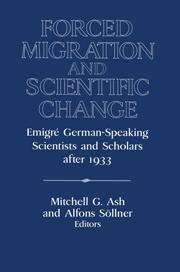Introduction: Forced Migration and Scientific Change after 1933
Published online by Cambridge University Press: 05 January 2013
Summary
The so-called “Law for the Reconstitution of the Professional Civil Service” of April 7, 1933, which authorized the dismissal or premature retirement from government service of persons who were not of “Aryan” descent or who were associated with groups considered politically undesirable in the new German state, was only the beginning of a massive, forced exodus mainly of Jewish scholars and scientists from Nazi Germany. Some particularly prescient intellectuals had already fled when the Reichstag burned in February of that year. The Nuremberg Laws of 1935, the invasion of Austria in March and the pogroms in Germany in November 1938, and finally the Nazi conquests in the rest of Europe made the emigration of scientists and scholars a mass phenomenon unprecedented in the modern history of academic life. Compared with the total of more than half a million refugees from Germany alone, the fate of approximately 2,000 academics and research scientists may seem of modest concern, but not when we remember how innovative some of these scholars and scientists were or became. Nonetheless, skeptical voices have been raised, asking among other things whether these innovations were indeed the results of emigration, or whether they might have occurred in any case. Did that “exodus of reason” in fact lead to significant scientific change, and if so, how should that change be characterized? The essays in this book attempt to provide answers to these questions, and thus to contribute to the comparative study of science in culture.
- Type
- Chapter
- Information
- Forced Migration and Scientific ChangeEmigré German-Speaking Scientists and Scholars after 1933, pp. 1 - 20Publisher: Cambridge University PressPrint publication year: 1996
- 5
- Cited by



